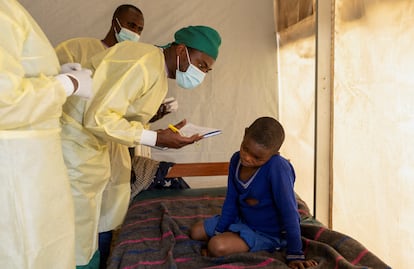WHO declares second international health emergency over spread of monkeypox
The organization has taken the measure due to the expansion of an apparently more lethal variant of the virus in Africa, which declared its first-ever public health emergency in response

The spread in Africa of a new and apparently more lethal variant of monkeypox (renamed mpox) led the World Health Organization (WHO) on Wednesday to declare a Public Health Emergency of International Concern (PHEIC), its highest alert level. This is the second time that the agency has activated this alert level, provided for in the International Health Regulations, for this disease, and the eighth time in history.
The WHO took the measure the day after the African Centers for Disease Control and Prevention declared the alert on the continent for the first time in history, after having registered 15,000 cases and 461 deaths due to this virus so far in 2024. The number of detected infections is much higher (160%) than at this time last year and is most likely only a small fraction of those that have actually occurred. Most of these cases are concentrated in the Democratic Republic of Congo (DRC), although the virus is already spreading to other countries such as Uganda, Kenya, and Rwanda.
The viruses tested belong to a different clade (Ib) than the one that triggered the international alert issued by the WHO in 2022, which ended in May 2023. Experts suggest that it may be more lethal than the previous one. In Africa, around 3% of those who test positive are dying, although it must be borne in mind that the levels of diagnosis on the continent are lacking and its health capacities, in terms of treatment, are considerably more limited than in developed countries.
As WHO Director-General Tedros Adhanom Gebreyesus has pointed out, we are not facing a single outbreak with a single clade, but many, with different variants, different modes of transmission, and different levels of risk. The consideration of an international health emergency does not imply any type of obligation for countries, but it allows greater agility when purchasing vaccines and allows African governments to skip some bureaucratic processes that slow down the process. According to Madhu Pai, a member of the McGill School of Global Health in Canada, 10 million vaccine doses would be needed in Africa, when only about 200,000 are available.
The first mpox clade was transmitted mainly through sexual intercourse. This new variant appears to be more easily transmissible. In this wave of transmission in the DRC, children are the main victims: 70% of positive cases are in children under 15 years of age, and 39% in children under five years of age, who account for 62% of deaths.
According to the latest assessment by the European Centre for Disease Control (ECDC), the risk posed by the new variant in Europe is “very low.” In a statement dated July 29, its director, Pamela Rendi-Wagner, declared: “I would like to stress that the risk to the EU/EEA population from the new mpox variant identified in DRC remains very low. ECDC is engaging with our partners in Africa in their efforts to contain this outbreak for the benefit of all those affected, prevent this new variant from spreading any further and reinforce future preparedness and response capabilities.” However, the agency is preparing a further risk assessment which it will publish in the coming days.
Sign up for our weekly newsletter to get more English-language news coverage from EL PAÍS USA Edition
Tu suscripción se está usando en otro dispositivo
¿Quieres añadir otro usuario a tu suscripción?
Si continúas leyendo en este dispositivo, no se podrá leer en el otro.
FlechaTu suscripción se está usando en otro dispositivo y solo puedes acceder a EL PAÍS desde un dispositivo a la vez.
Si quieres compartir tu cuenta, cambia tu suscripción a la modalidad Premium, así podrás añadir otro usuario. Cada uno accederá con su propia cuenta de email, lo que os permitirá personalizar vuestra experiencia en EL PAÍS.
¿Tienes una suscripción de empresa? Accede aquí para contratar más cuentas.
En el caso de no saber quién está usando tu cuenta, te recomendamos cambiar tu contraseña aquí.
Si decides continuar compartiendo tu cuenta, este mensaje se mostrará en tu dispositivo y en el de la otra persona que está usando tu cuenta de forma indefinida, afectando a tu experiencia de lectura. Puedes consultar aquí los términos y condiciones de la suscripción digital.









































